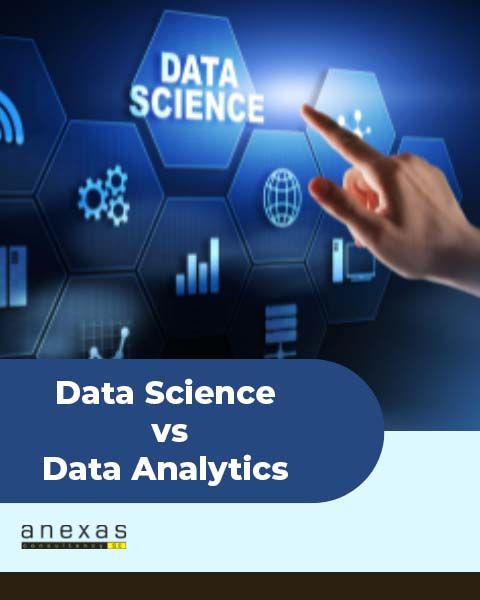Data Science vs Data Analytics
This article contains all the insight and information about data analytics Vs. data science. We will discuss different tools and techniques used in data science and data analyst job roles. We will cover the major differences between data science and data analytics. We will discuss concepts, processes, and tools used in both.
If you want to learn about Data Science and Data Analytics in an interactive session, join this free session.
Which is easier data science or data analytics? This article Data Science vs Data Analytics clarifies some of the most common myths and gives you a better understanding of Data Science and Data Analytics.

Difference between Data Science and Data Analytics
The main difference between Data Science and Data Analytics is in their area of work and domain expertise as we know that data analytics is a subset of data science. Data analytics is a work of filtering out data for representation that is meaningful to key stakeholders, while data science is a process of diving deep into data to make some statistical conclusions to make important business decisions.

What is Data Science?
Data science Is a multidisciplinary field which requires to work on the data available on different sources, structured or unstructured and then structuring the data correctly, mining it, making applicable assumptions, building association models, proving causality, and penetrating the data for symbols of anything that can carry business collision throughout.

How does Data Science Work?
Data science has different domains you have to master pertaining to computer science, data architecture, mathematics, and statistics. Data science involves research, finding data sources, and asking correct questions that are later answered in data analytics.
Difference between data science and data analytics with example
In a business scenario: where an organisation wants to finalise the vender and they have not much of data pertaining to vender performance based on quality, productivity, delivery etc. data science will solve this problem by using algorithms to establish required data architecture and data mining to pull out data doing research and then use hypothesis test for validation of assumption to conclude about vender performance or come out with data requirements and structure necessary for making the decision.
Skills required in Data Science.
- To become an expert in Data science, you need to master necessary skills for positions in different companies and organisations.
- Data Integration
- Deep Learning
- Big data
- Soft skills
- Functionality
- Programming
- Data Sourcing
- Machine Learning
What is Data Analytics?
Data analytics is a field where the main goal is to take out meaningful information out of existing data (generally not organised and are present in an ad-hoc manner) by organising and managing data and getting required inference and findings to present them to key stakeholders and business owners using visualisation tools
How does Data Analytics Work?
Data analytics answers all questions required to answer from a business point of view for the concerned organisation. Distinctive data analytics comes from the field of science, technology, engineering, or maths degree. Though, data analytics requires well-built skills in programming, maths, science, databases, modelling, and analytics.
Difference between data science and data analytics with example
Let us assume that a business wants to see; how the advertisement is affecting customer interest in the product. They have existing data like social media activity, OTT platforms, field data, and surveys (not well organized to work on) from lots of data sources. Data analytics will help in organizing data and doing the data mining, deducing an ideal result, and presenting the findings to process owners that will be channeled into marketing strategy moving forward.
Skills required in Data Analytics.
- Some of these top skills for data analytics comprise:
- Microsoft Excel
- Data Visualisation
- Presentation Skills
- Critical Thinking
- Machine Learning
- R or Python-Statistical Programming
- Structured Query Language
Difference between data science and data analytics in tabular form
| Data Science | Data Analytics |
| 1.They are familiar with database systems like MySQL and Hive etc. | Familiarity with data warehousing and business intelligence concepts |
| 2.Knowledge of R(optional), Python and java | In depth knowledge of SQL and analytics |
| 3.In depth knowledge of Statistics, mathematics, and data interpretation | Strong knowledge of Hadoop based analytics (HBase, Hive, MapReduce, Impada Etc.) |
| 4. Speciality in Hypothesis testing and correlation and data mining and predictive analysis | Data storing and retrieving tools and strong grip on data architecture. |
| 5. Prediction of business decisions. Deep analysis of data to take important decision. | Familiar with various ETL tools- for transforming different source of data into analytics data stores. |
| 6. Deep statistical insight and machine learning – Mahout, Bayesian, Clustering etc. | Should also be able to make some critical business feature real time. |
Difference between Data Scientist and Data Analyst?
The main difference between Data scientist and data analyst is their roles. Data analysts work with existing data sets for representation that is meaningful to key stakeholders, while data scientists work with raw data to make some statistical conclusions to make important business decisions. Data scientists use statistics, big data, Statistics, Python, SQL, data mining while Data analysts use python, data visualisation like BI or Tableau, MS office, Structured query language etc.

Data Scientist
Data scientists predict the requirements necessary for business decisions which need to be taken for organisational profit, independent of whether the existing data is present or not. They are experts in computer science, statistics, and data mining. Data scientists have a good experience in business driven by data which helps them to arrive at a solution to complex business problems.
Characteristics of a Data Scientist
Data scientist comes from a research background with sound knowledge of Programming, statistics and data mining and business. The key skills of a data scientist are Data Integration, Deep Learning, Big data, soft skills, Functionality, Programming skills, Data Sourcing, and Machine Learning. They have a lot of experience in doing work in ad hoc situations and they do proper communication to the management as and when required.
Roles and Responsibilities of a Data Scientist
- Identify valuable data sources and automate collection processes
- Undertake pre-processing of structured and unstructured data
- Analyse large amounts of information to discover trends and patterns
- Predictive modelling and extracting data through data mining.
- Build predictive models and machine-learning algorithms
- Combine models through ensemble data modelling
- Present information using data visualisation techniques
- Propose solutions and strategies to business challenges
- Collaborate with engineering and product development teams
skills required of a Data Scientist
Following are the key skills required for a data scientist to excel in the field of data science:
- Data Integration
- Deep Learning
- Big data
- Soft skills of business
- Functionality
- Programming
- Data Sourcing
- Machine Learning
- Advanced statistics
- Data Visualisation
- Data Aggregation
- Data acquisition
- Deriving Insights
- Decision making
- Communication skills
Data Analyst
Data analyst is a role whose main goal is to take out meaningful information out of existing data and present them to key stakeholders and business owners. A distinctive data analyst comes from the field of science, technology, engineering, or maths degree. Though, the applicant must also have well-built skills in programming, maths, science, databases, modelling, and prognostic analytics.
Characteristics of a Data Analyst
Data Analysts have problem solving skills, along with strong numerical skills. They should have great communication and presentation skills. They are required to have knowledge of querying languages, Excel, BI or Tableau etc, should have expertise in data visualisation and should work well with deadlines.
Roles and Responsibilities of a Data Analyst
Following are the roles and responsibilities of a data analyst:
- Analysing data using statistical techniques and providing reports
- Developing and implementing databases and data collection systems
- Acquiring data from primary and secondary sources and maintaining data modelling.
- Identifying, analysing, and interpreting trends or patterns in complex data sets.
- Filtering and cleaning data from an ad hoc database.
- Working with management to prioritise business and information needs.
- Locating and defining new process improvement opportunities.
skills required of a Data Analyst
Following are the skills requirements for a successful data analyst:
- SQL
- Microsoft Excel
- Tableau
- Python
- R
- SAS
- Microsoft PowerPoint
- Microsoft SQL Server
- Oracle
- Microsoft Power BI
- Analytical skills
- Basic statistics
- Communication skills
Which is a better career option for you? Data Science or Data Analytics
Each field has their own pros and cons. If we talk about the pay scale of a data scientist and data analyst, the earning of a data scientist($125k) is way higher than data analyst ($62k). If we talk about domain and business knowledge:
- Data scientists must have a wider understanding of business and they have bigger responsibilities. While data analyst needs aptitude and skills which can be acquired by any fresh graduate, it involves presentation and data analytics skills.
- Overall, it depends on your career interests and skills level and competencies that what you have chosen for your successful career.
- The only way we can decide which career to choose is by doing self-analysis.
For a career in Data Science or Data Analytics, Anexas Data Science courses will train you in the latest syllabus including training of programming languages and tools, coding assignments, industry worked-out projects, job assistance and finally a certification to upskill your career. Join any course which is relevant to you.
Data Science – Basic Course
Data Science – Intermediate Course
Data Science – Advance Course
Data Science vs. Data Analytics vs. Data Engineering vs. Machine Learning
Data Science often incorporates various elements of statistics and machine learning. On the other hand, Data Analytics focuses specifically on inspecting, cleansing, and transforming data to discover useful information, draw conclusions, and support decision-making. Data Engineering, meanwhile, concentrates on the architecture, database management, and processing required to produce specialized datasets for different uses, including analytics. It provides the foundation and structure that data scientists and analysts use to perform their tasks. Machine Learning is a subset of data science where computers are trained to learn from data, enhancing their decision-making abilities without being explicitly programmed for a specific task.
Difference Between Data Science and Data Engineering
While both Data Science and Data Engineering revolve around data, they serve distinct purposes. Data Science is more about drawing actionable insights from complex and unstructured data. It involves a mix of statistics, machine learning, and domain-specific knowledge to interpret and utilize data in innovative ways. Data Engineering, in contrast, focuses on creating the infrastructure for data generation, storage, and retrieval. Data engineers design and maintain the architecture (like databases and large-scale processing systems), pipelines, and data sets that data scientists use for their analyses.
Data Science and Analytics Jobs
The surge in big data has led to a boom in data science and analytics jobs. Data Scientists are professionals skilled in interpreting and using complex data structures to solve specific problems. Their role often overlaps with statisticians and data analysts, but they predominantly deal with interpreting vast data sets and using machine learning tools. Data Analysts, on the other hand, sift through data and provide reports and visualizations to explain what insights the data is revealing. Their role is crucial in business decisions, as they often provide the evidence-based insights that leaders use to make choices. Both professions require a mix of technical and soft skills, with an emphasis on communication, especially when translating complex data insights into actionable business strategies.
Data Science vs. Business Analytics
Data Science and Business Analytics are closely intertwined fields, but they serve different purposes. Data Science focuses on extracting meaningful insights from large and unstructured datasets using algorithms, machine learning, and statistical methods. It’s a broader field that can be applied to various domains, from healthcare to finance, aiming to extract patterns and insights from data. Business Analytics, however, is narrower and more applied. It specifically targets business-related problems, using statistical analysis and data visualization to inform business decisions. The primary goal of business analytics is to improve business operations, drive efficiency, and boost profitability.
Conclusion
To summarise, data science and data analytics are two different ways professionals help any organisation to comprehend large amounts of data, the data science dive deep and research on possible data architecture and new data requirements and predict the necessary business decisions to be taken for organisational profit. Data analytics on the other hand works on existing data to get necessary information using data mining and convert the useful information to graphs and charts using data visualisation.
FAQS
How is data analytics different from Data Science?
Data scientists work on developing questions to be asked and data analysts will answer those questions. Data analysts work with existing data and data scientists develop hypotheses and test them with statistics tools.
Which is better, Data Scientist or Data Analysts?
Both have different implications and each role have their own pros and cons
Can data analysts work as data scientists?
No, data analysts need additional skill to become a data scientist for example deep knowledge of statistics.
How to become a Data Scientist?
You do professional certification or a degree course from recognised institutions. Additionally, you need experience and understanding of business and organisational temperament.
How to become a Data Analyst?
You do professional certification or a degree course from recognised institutions. Unlike data scientists you can start as a fresher
Which is having a higher salary, data scientist or data analyst?
Data Scientist. The earning of a data scientist is higher than data analyst in terms of domain and business knowledge
How much experience is required to become a data analyst?
You can start your career as a fresher. Although it requires a lot of skills and knowledge discussed in the article.
Is becoming a data scientist hard?
There are lots of skills required to become a data scientist, but with consistent efforts and learning you can easily ace it.
Whom to contact for certification in data science?
Please contact [email protected] or go to our website anexas.net for information
I don’t know where to begin
Anexas is providing a free data science workshop for beginners, we are also providing free career guidance to our participants
Also read our article on What does data science do





